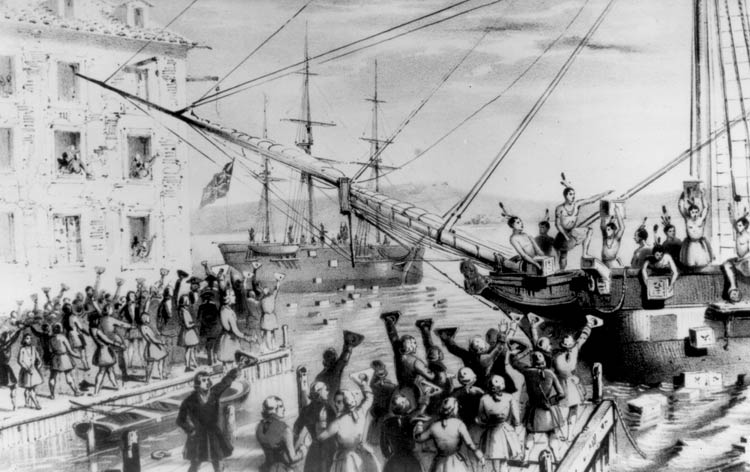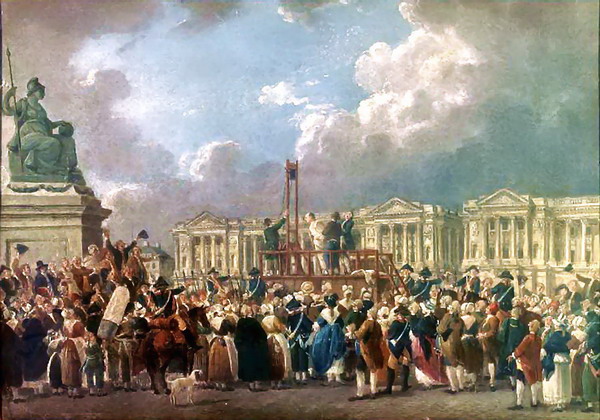The Boston Tea Party was an act of protest of the American colonists against Britain and is considered a forerunner of the War of Independence of the United States. Occurred on December 16, 1773 in Boston in which they threw into the sea a cargo of tea.
The rebellion of the settlers in the port of Boston (Massachusetts) was born as a result of the approval by Great Britain in 1773 the Tea Act, which recorded import into the metropolis of different products, including tea, to benefit the East India Company, the colonists boycotted buying tea from the Netherlands.
What happened at the Boston Tea Party?
Background
The law of bell Townshend Acts 1765 and 1767 did the settlers are displeased about the British decisions on imposing taxes to the colonies without consultation of the Parliament of Westminster. One of the protesters was John Hancock. In 1768, the boat Liberty Hancock was retained by customs officials and smuggling charges against him. John Adams defended the charges were finally dropped. However, Hancock had to face after many other accusations.

Hancock organized a boycott of tea from China and sold by the East India Company, sales to the colonies which fell from 145,000 kg to 240 kg. Since 1773 the company had large debts, large stocks of deposits and has no prospect of sales, as smugglers Hancock expensive imported tea without paying tariffs. The British government approved the Tea Act, which allowed the East India Company to sell tea to the colonies directly, without paying any customs duty or tax in Britain in exchange for colonial pay the tariff, which was much smaller . This suspension of taxes allowed the Company to sell at prices lower than those offered by the merchant colonists and smugglers.
The settlers, especially wealthy smugglers, offended by the favorable treatment to a company that had acted as a lobby and had exerted great influence in Parliament. As a result, there were protests in Philadelphia and New York, but were demonstrations that took place in Boston that marked history. Still recovering from the incident of “letters of Hutchinson,” the settlers of Boston suspected that the new tax on tea was simply another attempt by the British parliament to bring down the colonial autonomy. Samuel Adams, prosperous smugglers and others who had profited from the smuggling of tea, demanded to representatives and agents of the East India Company to abandon their posts. The agents who doubted were frightened with attacks on their deposits and even their homes.
The first of many boatloads of tea East India Company was the HMS Dartmouth, who arrived in late November 1773. At that time, found themselves in an impasse between the port authorities and Sons Freedom. Samuel Adams Aviv increasing multitude demanding a series of protest meetings. Thousands attended these meetings from the city and outlying areas, each larger than the last meeting. Crowds cried not only disobey the British Parliament, the East India Company and the HMS Dartmouth, but the governor Thomas Hutchinson, who fought because you were downloaded. The night of December 16, the assembly protesting the Old South Meeting House in Boston was the largest seen before. It is estimated that around 8,000 people attended.
Events
The evening of the same day, put up movement. Before you download tea, the Sons of Liberty (according to sources, between 60 and 150 people) is disguised as Mohawk Indians, leaving the great assembly of protest and Griffin drove the dock, where they were Dartmouth and Beaver and newly arrived ships Eleanour. Quickly and effectively armed with axes and knives, and esporuguiren sailors climbed up boxes of wine on the deck (reasonable evidence that some of the “Indians” were actually longshoremen). Opened the boxes and threw the tea overboard. The study, which lasted well into the night, take less than three hours, was thorough and effective. At dawn on 45 tons of tea, with an estimated value of £ 10,000 had been spilled in the waters of Boston Harbor. are not damaged or stole anything, except a padlock broken accidentally and replaced anonymously shortly after. Tea fleet on the shores around Boston for weeks.
Reaction
The event attracted much criticism from officials of the colony as British. For example, Benjamin Franklin declared that the cost of tea was to be reimbursed and offered to pay it with their own money. From the metropolis were carried out repressive measures against the colonies: The British government closed the port of Boston in 1774 as retaliation and declared a state of emergency, restoring other laws known as the Intolerable Acts, also called “coercive laws “or” Punitive Laws. ” However, a number of settlers was inspired to carry out similar acts such as the burning of the boat Peggy Stewart. The Boston Tea Party, over time, proved to be one of several causes that led to the War of Independence of the United States. At least this riot and the reaction that followed served to consolidate the support of the revolutionaries Thirteen Colonies that eventually were successful war of independence.
Regarding the consumption of tea, many colonists in Boston and elsewhere in the country, swore not to take this drink as a sign of protest, preferring other herbal teas and coffee. However, this social protest movement against the tea consumption was not lasting.
International Influence
What happened at the Boston Tea Party is known worldwide and was an inspiration for other rebellions. For example, Erik Erikson said in his book Gandhi’s Truths (truths Gandhi) when Mahatma Gandhi met with the viceroy British in 1930, after the Salt March, he took a pinch of salt, free of tariffs from his blanket and said with a smile, that the salt had reminded the famous Boston Tea Party.

